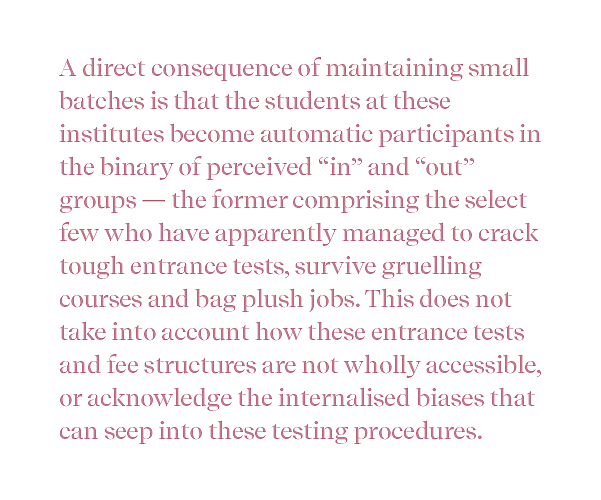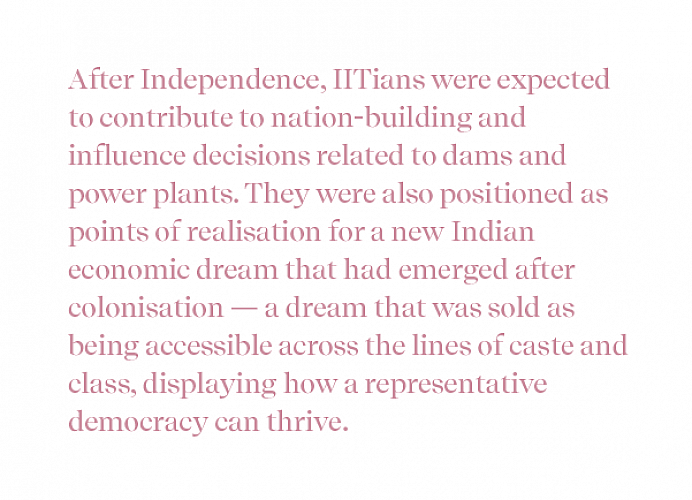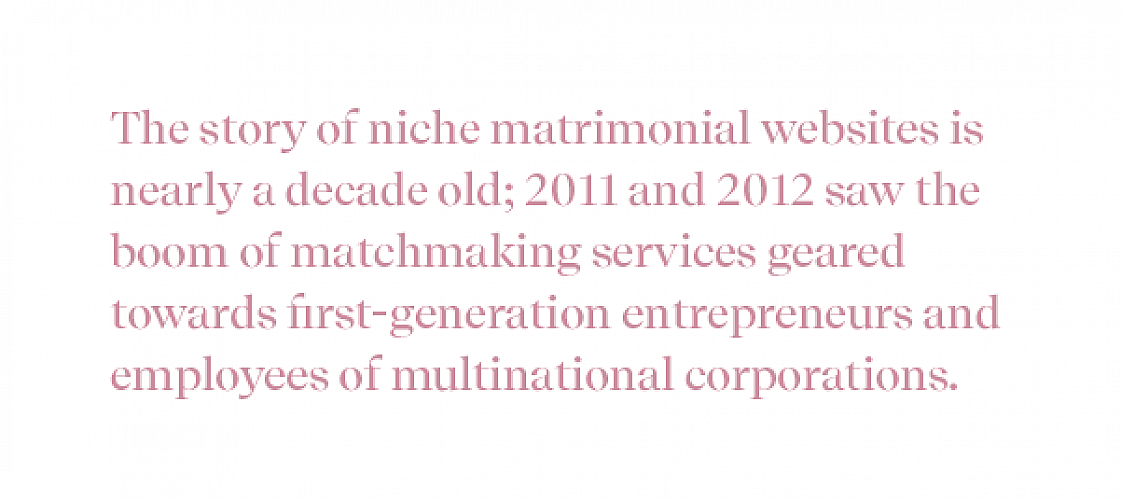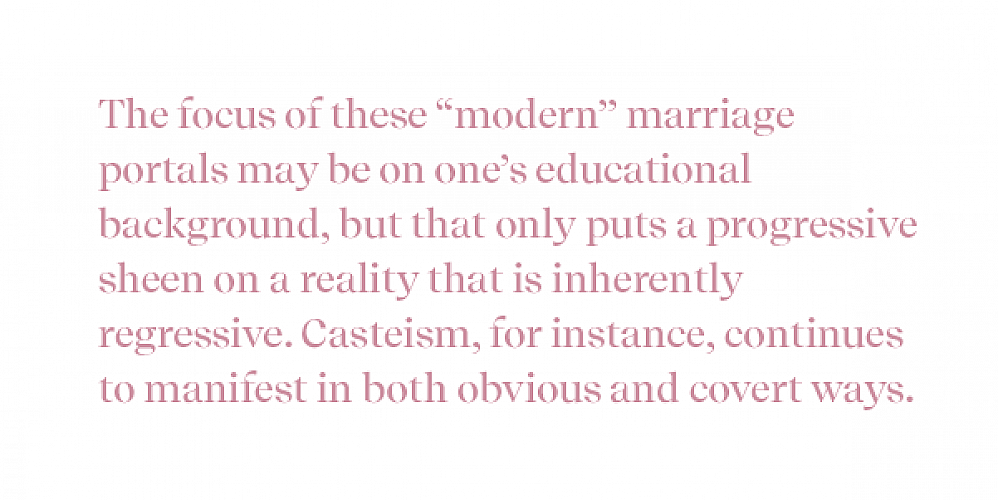Textual content by Neerja Deodhar. Illustration by Gaurav Vikalp.
In late March this 12 months, a video that includes Karan Johar sitting in a bright-red armchair in opposition to a flashy backdrop — harking back to his widespread English-language discuss present Koffee With Karan — went viral. He spouted a part of that iconic Kuch Kuch Hota Hai dialogue: “Hum ek hello baar jeete hain, ek baar marte hai, aur shaadi bhi ek hello baar karte hai.” (We reside solely as soon as, die as soon as, and get married solely as soon as.)
In the identical breath, and along with his acquainted, smug smile, he added, “…agar aap extremely educated ho, toh aap age, caste, top vagerah dekhne se pehle, ek associate mein psychological compatibility dhoondte ho.” (…if you’re extremely educated, you’re going to search for psychological compatibility earlier than attending to age, caste, top, and many others.) As our collective Cupid and agent of affection, he was right here to induce the alumni of the nation’s a number of administration and engineering institutes to join IITIIMShaadi.com.
The matrimonial web site’s meme-worthy second within the nationwide highlight got here eight years after its conception. “Whenever you marry by way of iitiimshaadi dot com, it’s not known as a wedding it’s known as an alumni affiliation,” tweeted one consumer. Predictably, folks have been amused and outraged {that a} platform reminiscent of this exists and that, of all folks, Johar was the one selling it. Why was the “flag bearer of nepotism” — a heavy crown the Bollywood producer-director has unapologetically worn for greater than half a decade — speaking about advantage and {qualifications}? However I suppose one might argue that his hyperlink to the model isn’t so tenuous in the event you contemplate that his career-defining movies are all sagas about heterosexual “happily-ever-afters”.
Underneath the possession of the central authorities, the primary IITs (Indian Institutes of Know-how) have been arrange within the ’50s, and the IIMs (Indian Institutes of Administration) within the ’60s (in the present day, IITs are in 23 cities and IIMs in 20). By the early 2000s, they’d begun to problem the notion of upper-crust education that had existed within the pre-liberalisation period and was solely accessible to a choose few: a fancy boarding college, a level at a notable Delhi faculty and an Oxbridge stint to spherical it off. “A level [in engineering] is taken into account a ticket to wealth and success,” wrote Vaishali Honawar in 2005. With IIT, as with IIM, annually’s cohorts are extraordinarily small in proportion to the variety of candidates, which may be within the lakhs (in 2021, a whopping 9.39 lakh candidates took the doorway check for the IITs, whereas 1.9 lakh candidates appeared for the IIM CAT). Relying on the programme, the price of tuition can go as much as 10 lakhs for IIT and 23 lakhs for IIM, and it isn’t unusual for fogeys of the scholars to take out loans to satisfy the requirement.
A direct consequence of sustaining small batches is that the scholars at these institutes change into automated members within the binary of perceived “in” and “out” teams — the previous comprising the choose few who’ve apparently managed to crack robust entrance assessments, survive gruelling programs and bag plush jobs. This doesn’t bear in mind how these entrance assessments and payment buildings usually are not wholly accessible, or acknowledge the internalised biases that may seep into these testing procedures. In a 2015 piece for Scroll.in, Mayank Jain wrote about how a major chunk of scholars have been taking a look at engineering as an choice as a result of “status and respect” related to it, chalking this statistic to 80 per cent within the case of a small group that was interviewed to gauge this.
Nevertheless, regardless of a unbroken fixation with engineering institutes — which take pleasure in a cult-like following — a major variety of engineering graduates don’t find yourself working of their space of specialisation. Two years after the above statistic got here out in Scroll.in, a Hindustan Instances article pessimistically requested if the nice engineering dream had died as the vast majority of IIT-Bombay alumni have been, by then, pursuing careers in finance, consulting and the IT trade — and a mere 22 per cent have been occurring to work in engineering and know-how.
The IITs got here beneath criticism for “failing to align their targets with the democracy’s” and primarily supplying consulting companies and developed nations with extremely certified labour. That is as a result of alumni’s propensity to prioritise packages over looking for careers of their areas of specialisation. After Independence, IITians have been anticipated to contribute to nation-building and affect selections associated to dams and energy vegetation. They have been additionally positioned as factors of realisation for a brand new Indian financial dream that had emerged after colonisation — a dream that was bought as being accessible throughout the traces of caste and sophistication, displaying how a consultant democracy can thrive. “It’s value noting on this context that, in an underdeveloped however blended financial system, the place upward mobility is the only tenet of the center class, employment takes centre-stage and pushes analysis right into a secondary place,” acknowledged IIT-Kharagpur professors Gourishankar S. Hiremath and H. S. Komalesha in 2018.
After the implementation of the ’90s financial reforms, each institutes got here to symbolise credibility for a swathe of the inhabitants whose dream of upward mobility rests on the pursuit of training. And within the present blended financial system — the place there may be additionally an energetic effort to gauge success by way of materials acquisition — IIT-IIM levels are without delay a descriptor, a measure of 1’s value, a two-word elevator pitch, a option to earn respect and a way by which to face aside. They’re a stand-in for a full-page CV. They’re compelling sufficient for a pair to particularly search out an “IITian’s sperm”.
Shortly after I had learnt about IITIIMShaadi.com, I turned conscious of a web site known as FAANGShaadi by way of a sarcastically worded Linkedin put up by a consumer of the networking web site. The put up claimed that it was a matrimonial web site that catered to staff of firms like Fb (Meta), Amazon, Apple, Netflix and Google (Alphabet), including that the matchmaking web site was “powered by AI” and customers needed to take a coding problem to be thought-about eligible. A couple of hours after the put up went viral and garnered reward from the members of the platform, the writer added an edit: “This [website] was an April Idiot’s Joke and together with quite a lot of others, they bought me”.
The story of area of interest matrimonial web sites is sort of a decade previous; 2011 and 2012 noticed the growth of matchmaking providers geared in the direction of first-generation entrepreneurs and staff of multinational firms. Platforms like Mymitra, notably devised and developed for IIT-IIM-Ivy League circles, gained recognition. These early entrants into the wedding market promised authenticity: customers had to enroll with faculty certificates, and matchmaking was supposedly pushed by “machine studying, large knowledge and psychology methods”. Mymitra’s inside rating mechanism even promised that “the most effective and the bold all the time rank greater and are displayed on the prime of each search outcome…for the primary time, extremely completed folks get extra prominence over others”.
IITIIMShaadi.com allegedly has over 1,50,000 members who’ve paid the “till marriage” payment of 32,922 rupees, although not all have been authenticated. Presently, about 30,000 members have met the criterion of attending an accepted institute on the web site and are energetic. The FAQ web page clarifies that the minds behind the platform are extra invested within the high quality than the amount of matches.
Sarcastically, its founder, Taksh Gupta, didn’t attend both of the universities whose reputations he was counting on for his model. His personal instructional background turned a punchline after Johar’s endorsement earlier this 12 months (Gupta attended the S. P. Jain College of International Administration, which technically does meet the positioning’s standards). Responding to a query about what he envisions for the portal’s future, he mentioned, “We need to and are going to supply such a boutique expertise to our members that folks, who’re at present not eligible to register, research a course which makes them eligible to register at IITIIMShaadi.com simply in order that they will search their associate by way of us.”
Anisha Kumar*, a second-year MBA pupil at Xavier College of Administration (XLRI), believes the single-minded pursuit of upward financial mobility is inspired from adolescence: “Most of us haven’t recognized every other markers of success”. She additionally says that inside the realm of romantic compatibility, potential for compatibility is tied to the opposite individual’s scholastic achievement. IIT-Bombay alumnus, Shivaprasad M (27), presents a view that a number of different interviewees additionally imagine: “Many graduates of premier institutes attain a sure place in life after grinding it out [working hard] — they assume the world owes them a partner they deserve”.
In the course of the second wave of the COVID-19 pandemic, a daunting variety of jobs have been misplaced in line with the Centre for Monitoring Indian Financial system (CMIE). This determine is estimated at two crores between April and Could of 2021, and 40 per cent of those that misplaced their jobs at the beginning of the pandemic have been unable to search out employment once more for at the least 10 months. In the identical 12 months, 60 college students from IIT-Delhi alone secured placement packages value rupees one crore each year on the very first day of the position drive whereas graduates from some branches bagged worldwide placements value two crores and above. Urooj Akhlaq, a 22-year-old IIT graduate based mostly in Bengaluru, factors out that new graduates are unlikely to interview at firms that provide salaries beneath rupees 10 lakh each year as a result of “it’s not befitting of an IITian’s standing”.
In 2018, an trade observer famous {that a} start-up founder who didn’t attend an IIT or IIM is prone to get consideration or funding from buyers provided that they’ve a profitable product or a confirmed monitor file, whereas a founder with a level from both is prone to entice consideration even with out these tangible determinants.
Talking about navigating the seek for a associate whereas being a pupil and of “marriageable age”, Kumar explains the impulse to reconcile romantic need with profession ambition: “In enterprise colleges, persons are largely of their mid-twenties, and there’s a need for a associate. The simplest factor to do, then, is date somebody on campus, who will doubtlessly work in an identical trade, make an identical amount of cash and need related issues from life,” she informed me. A number of of those determinants appear utilitarian and shorn of romance, I counter. “Consultants date consultants, they usually additionally date like consultants. They calculate how a lot sense it makes up to now one individual over one other. I’ve seen folks make execs and cons lists to see which packing containers on the parental guidelines may be ticked off,” she responds.
In terms of a possible associate’s reactions to their ambitions and profession trajectories, the common feminine candidate experiences a significantly larger quantity of tension than their male counterparts. In 2014, IIT alumna and writer of the books Heartbreak & Goals! and Organized Love, Parul Mittal, mentioned that girls who graduate from IITs need grooms whose mind matches their very own, however males “desire a easy homemaker as life associate over an bold profession girl because it maintains household steadiness”. Tales of the skewed intercourse ratio on the IITs have abounded since its inception. In IIM and different eminent administration institutes, nonetheless, the variety of ladies candidates is steadily rising.
Sanya Patel*, a former pupil of the Nationwide Institute of Know-how and the Indian College of Enterprise, hasn’t used the providers of portals like IITIIMShaadi.com — however she understands their enchantment. She asserts that her profession is a major a part of her life, so any potential associate might want to settle for the targets and ambitions she has outlined for herself, alongside together with her potential to earn large cash. “[Normally] males don’t have to consider it, however as ladies in India, we actually have to be sure that the delicate male ego isn’t harm. The concern is all the time there,” the 28-year-old tells me, including, “The probabilities {that a} non-tier-1 pupil [a student from a university that is not top-ranking] will be capable to match my ambition and wage are low. Exceptions all the time exist, in fact. I’m not being elitist, however I imagine that’s a good ask.” Throughout conversations with alumni of the institutes and customers of unique matrimony platforms, I discovered that many imagine wealth, extravagant existence and promising profession prospects are a “honest ask”, conflating these with romantic potential.
The dream to attend an IIT or an IIM may be very prone to be parent-driven, and, in some circumstances, it exists solely due to one’s mother and father. Compounding the difficulty is the expansion of parental expectations when kids get into establishments of be aware: “Individuals start interrogating these mother and father about what job their youngster is prone to get, how a lot they might doubtlessly earn — and who they are going to ultimately marry,” says Akhlaq. “In addition they touch upon how a lot dowry a male youngster might get if he bought into such a school, and the way a daughter-in-law with educational {qualifications} and promising profession prospects can doubtlessly pay a bigger dowry.”
And these expectations differ based mostly on the household’s socioeconomic background: mother and father from economically strained households understand an IIT diploma as the ultimate frontier of their youngster’s training and a method for the kid to enhance the household’s prospects, discovered a survey of IIT college students who enrolled in 2015. Whereas upper-middle-class households want for his or her youngster’s success to be acknowledged and see their achievements as being tied into the household’s standing.
An obsession with familial popularity additionally brings with it the concern of “marrying down”. “If your loved ones wears your achievements as a badge of honour, it bolsters your sense of self-worth. You need to preserve that up, even by way of matrimony and youngsters,” says Kumar.
The main target of those “trendy” marriage portals could also be on one’s instructional background, however that solely places a progressive sheen on a actuality that’s inherently regressive. Casteism, as an illustration, continues to manifest in each apparent and covert methods. Ashok Singh*, a 27-year-old product supervisor at a number one matrimony web site, says that along with filters like wage {and professional} background, most web sites additionally allow people to behave on their caste-based biases. “I’ve seen that those that graduate from IITs and IIMs often need to marry inside the identical caste and specify how a lot they need their potential partner to earn,” he mentioned.
Kumar mirrored that those that graduate from programs like hers are inclined to take fewer “dangers” reminiscent of marrying outdoors of their caste, a choice that might neither be anticipated nor tolerated by their mother and father. “They [her peers on campus] aren’t really unbiased from their households…. If your loved ones has taken out a 25-lakh training mortgage, you undoubtedly really feel such as you owe them,” she mentioned.
The reality is that it’s tough for such web sites to not be casteist, even when they avowedly declare indifference to the social construction. Caste is on the basis of the mainstream dialog about what we perceive as educational advantage. For much too lengthy, Indian savarna society has regarded down on reservations and pedestalised those that safe seats in prestigious instructional institutions on their very own “advantage”. This reductive perspective reductions the benefits afforded to those that come from privileged caste backgrounds. It additionally individualises the understanding of accomplishment as being the results of solely intelligence, perseverance and laborious work. On elite campus grounds, the place we search out companions whose social backgrounds are just like our personal, we create a smokescreen that enables us to be comfy with our biases. The query value asking, then, is how a lot of our romantic need is actually rooted in particular person company?
*Names modified on request



